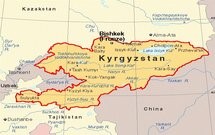 The fundamental reason for this instability is Kyrgyzstan's geography. The country is nearly entirely mountainous, which has caused political divisions, particularly between north and south. This has spurred a political system heavily reliant on regional- and clan-based support mechanisms, making it difficult for any leader to build a consensus among the country's various parties and interests. Akayev, a northerner, and Bakiyev, a southerner, never fully consolidated power and were ousted as a result.
The fundamental reason for this instability is Kyrgyzstan's geography. The country is nearly entirely mountainous, which has caused political divisions, particularly between north and south. This has spurred a political system heavily reliant on regional- and clan-based support mechanisms, making it difficult for any leader to build a consensus among the country's various parties and interests. Akayev, a northerner, and Bakiyev, a southerner, never fully consolidated power and were ousted as a result.
After Bakiyev's ouster, Kyrgyzstan sought to rectify this problem by transitioning to a parliamentary system of government. Though this system expanded parliament's power at the expense of the presidency, parliamentary coalitions -- made up of parties that represent both the north and the south -- also have been difficult to maintain. The country's 120-seat parliament is about evenly split between five parties from various regional backgrounds. No one party can command a strong or stable majority, leading to frequent squabbles and coalition breakups.
This has led to a strengthening of the presidency under Almazbek Atambayev, a northerner. He has been careful, however, not to go too far in attempting to consolidate power. But even this has not prevented political tensions. In October 2012, Kamchybek Tashiev, the head of the southern-based Ata-Jurt party, led protests in Bishkek calling for the overthrow of the government. According to some rumors, Bakiyev, who is living in exile in Belarus, is also whipping up his supporters against the government. Tashiev has since been arrested. His detention has spawned protests from his supporters in Jalal-Abad and in Bishkek. The verdict in his case, which is expected March 15, could inflame protests.
Domestic political tensions are not the only problem in Kyrgyzstan. The complex borders in Central Asia -- designed by Stalin to prevent a powerhouse from emerging in the region by tying its countries down in perpetual border disputes -- have also undermined Kyrgyzstan's stability. Kyrgyzstan's porous and poorly demarcated borders have led to frequent tensions and violence with its neighbors, particularly Uzbekistan. In June 2010, widespread ethnic violence erupted between Kyrgyz and Uzbeks in the Osh and Jalal-Abad regions of Kyrgyzstan. A recent dispute in the Uzbek exclave of Sox, which is surrounded by Kyrgyzstan's Batken province, resulted in threats of military action from both sides. Protests over Uzbek actions along the border continue to be a regular feature in southern regions of Kyrgyzstan, and a military buildup by Kyrgyzstan sparked by the latest dispute could increase tensions in the region.
Another issue is Kyrgyzstan's economic situation. Lacking the significant deposits of oil or natural gas of some of its neighbors, Kyrgyzstan is one of the poorest countries in the former Soviet Union. It is heavily reliant on remittances from Kyrgyz workers in Russia. Kyrgyzstan's main industrial output comes from gold mining, and this has been under threat lately over issues between the government and the Canadian-run company Centerra Gold, which operates the Kumtor gold mine. The government has been attempting to gain a greater stake in Kumtor, which produces 60 percent of the country's industrial output and around 12 percent of its total gross domestic product, though the Canadian company has resisted this via legal action. Tashiev raised the Kumtor issue in the protests he led against the government, demanding swift nationalization. Similar calls have inspired rallies in Bishkek and other cities, such as Naryn.
Moscow shares Bishkek's interest in maintaining stability in Kyrgyzstan. Russia maintains a military presence at the Kant Air Base and is likely to increase its security presence in Kyrgyzstan after the scheduled U.S. withdrawal from its own air base in Kyrgyzstan after NATO operations in Afghanistan end in 2014. To ensure stability and Bishkek's continued loyalty, Moscow has provided Kyrgyzstan financial assistance and duty-free oil products in a bid to salve Kyrgyzstan's numerous economic and social problems. While such help from Russia does not come without a cost -- Kyrgyzstan recently sold its main energy firm, Kyrgyzgaz, to Russia and is an official candidate to join the Moscow-led Customs Union by 2014 -- it has been in Bishkek's interests to align with Russia in exchange for Russian assistance in dealing with Kyrgyzstan's various issues. Still, help from Russia does not guarantee that Kyrgyzstan can prevent the issues that have plagued it since post-Soviet independence from undermining its stability, meaning even minor protests can turn into something more serious.
Courtesy : Stratfor (www.stratfor.com)